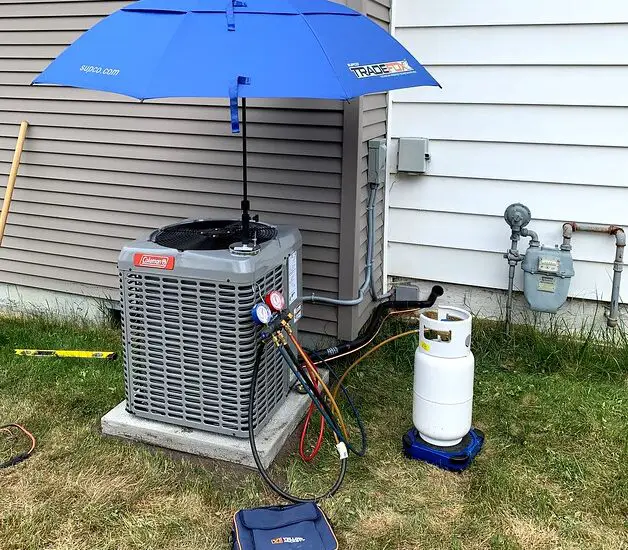Refrigerant top up isn’t just a buzzword in the world of cooling systems. It’s a fundamental task that, when done right, keeps your system running smoothly and your sweat beads at bay. Whether it’s your home air conditioner or your car’s cooling system, knowing how to top up your refrigerant can save you a ton of discomfort and a fair bit of cash. So, buckle up as we demystify this seemingly technical task.

This work is licensed under a Creative Commons Attribution 2.0 Generic License.
Table of Contents
What Does It Mean To Top Up Refrigerant?
Definition of Refrigerant Top Up
A refrigerant top up, put simply, is the process of adding more refrigerant into a cooling system. It’s like topping up your car’s gas tank, but with a substance that makes your car (or your home) feel like a breezy summer day even when it’s scorching outside.
Importance of Refrigerant Top Up
Why is a refrigerant top up such a big deal, you ask? Well, without enough refrigerant, your cooling system won’t cool. It’s the secret sauce that absorbs heat from your space and expels it outside. Without it, you’re just blowing hot air – literally!
Why you Should Top Up Your Refrigerant
Signs Your System Needs a Refrigerant Top Up
Think your system might be low on refrigerant? Watch out for these telltale signs: a cooling system that takes forever to cool, unusually high electricity bills, or even a system that’s running non-stop. If your system is displaying any of these symptoms, it might be crying out for a refrigerant top up.
Risks of Operating a System with Low Refrigerant
Ignoring these signs isn’t just uncomfortable – it’s risky. Running your system on low refrigerant can damage it over time. It’s like running a car on empty – sooner or later, it’s gonna break down.
How To Top Up a Refrigerant?
Steps to Perform a Refrigerant Top Up
Ready to top up your refrigerant? First things first, you’ll need to switch off your system. Then, locate the service valve and attach your refrigerant source. Next, open the valve and let the refrigerant flow in. Remember, safety first – always wear gloves and goggles.
Tools and Equipment Required for a Refrigerant Top Up
Before you start, make sure you have the right tools. You’ll need a refrigerant canister, a can tap, and a pair of gloves and goggles for safety. And, of course, a little bit of courage never hurts!
To read more in-depth articles on refrigerants, click here: Articles on Refrigerants: The Ultimate Guide to Understanding Them
Special Considerations When Topping Up the Refrigerant in a Car
Identifying the Need for a Car Refrigerant Top Up
Car cooling systems have their own set of telltale signs. Is your car’s A/C blowing warm air? Is the cooling slower than a snail’s pace? If so, your car might be low on refrigerant.
Steps to Top Up Refrigerant in a Car
Topping up refrigerant in a car isn’t much different from a home system. You’ll still need to locate the service valve, attach your refrigerant source, and open the valve. But remember, car systems are more compact, so you’ll need to be a bit more careful.
Risks and Precautions for Car Refrigerant Top Up
With cars, there’s an added risk of overfilling. Too much refrigerant can damage your car’s A/C system. So, make sure to check your car’s manual for the correct amount, and don’t get too top-up happy!
Professional Assistance for Refrigerant Top Up
When to Seek Professional Help for a Refrigerant Top Up
Not feeling confident about doing a refrigerant top up yourself? No worries. Some situations call for a pro. If your system is leaking refrigerant or if you’ve never done a top up before, it’s best to call in a professional.
What to Expect from a Professional Refrigerant Top Up
Getting a pro to do your refrigerant top up means you can sit back and relax. They’ll handle everything from checking for leaks to adding the refrigerant. And you can expect to pay anywhere from $100 to $400, depending on your system.
Conclusion
There you have it – your no-sweat guide to refrigerant top up. With this knowledge, you can keep your cool, save your cash, and extend the life of your cooling systems. And remember, if in doubt, don’t hesitate to call in a pro. Stay cool, folks!